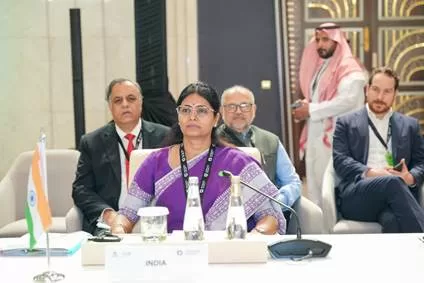Jeddah, Saudi Arabia, November 17, 2024
Union Minister of State for Health and Family Welfare, Smt. Anupriya Singh Patel, delivered a compelling address at the 4th High-Level Ministerial Global Conference on Antimicrobial Resistance (AMR) in Jeddah, Saudi Arabia, emphasizing the urgent need for a unified global strategy to tackle AMR. The conference, themed “From Declaration to Implementation – Accelerating Actions Through Multisectoral Partnerships for the Containment of AMR,” brought together international leaders to discuss actionable measures to combat this growing health threat.
AMR: A Global Challenge Requiring a Unified Approach
In her address, Smt. Patel underscored AMR as a critical global health challenge, necessitating a “One Health” approach that integrates human, animal, and plant health with environmental considerations. “AMR is a global health threat requiring urgent action through multisectoral cooperation. It is imperative that we address this challenge holistically across sectors,” she stated.
India’s Roadmap for Tackling AMR
Highlighting India’s commitment, Smt. Patel outlined a comprehensive strategy to enhance AMR detection, surveillance, and governance. “India proposes a robust approach to improve AMR detection and surveillance capacities, ensuring data-driven antimicrobial use at both local and national levels. This will pave the way for integrated and interoperable surveillance systems,” she said.
India’s proposals include:
- Strengthening Surveillance and Data Utilization: Establishing integrated systems to monitor AMR across sectors.
- Sustainable Financing and Research Investments: Prioritizing research to combat AMR effectively.
- Global Cooperation and Accountability: Supporting the creation of an AMR Multi-Partner Trust Fund and an Independent Panel on Evidence for Action against AMR by 2025.
- Addressing Access and Affordability Barriers: Advocating for regional manufacturing hubs and regulatory improvements to ensure equitable access to antimicrobials, diagnostics, and vaccines, particularly in Low- and Middle-Income Countries (LMICs).
Global Commitments and Local Solutions
Smt. Patel highlighted the importance of localized strategies, stating that factors contributing to AMR differ by region and require tailored solutions. She also emphasized capacity building in statistical modeling to monitor AMR-related deaths, aligning efforts with the global target of reducing such deaths by 10% as set in the UNGA Political Declaration.
Jeddah Commitments for Coordinated Action
The conference concluded with the adoption of the ‘Jeddah Commitments’, aiming to operationalize the UNGA AMR declaration. These commitments call for the establishment of national AMR multi-sectoral coordinating bodies, enhanced funding for National Action Plans, and the integration of AI technologies to improve surveillance and policy-making.
India’s Vision for a Collaborative Future
Reiterating India’s support for global AMR efforts, Smt. Patel stressed the importance of context-specific, sustainable interventions. “India remains committed to combating AMR while ensuring equitable access to solutions for all nations,” she affirmed.
The conference marks a pivotal step in advancing global AMR containment efforts, with India playing a leading role in shaping policies and partnerships to address this pressing health challenge.











